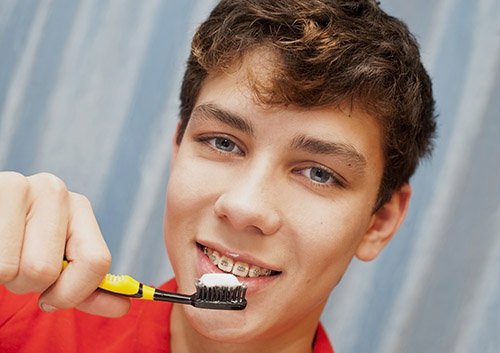Bells and Whistles for Your Bristles?
April 26th, 2023

Modern dentistry has made the most of today’s technological innovations. And we’ve come a long way from the fraying sticks our ancestors used as toothbrushes.
On the other hand, while it’s a lot better than a fraying stick, the manual toothbrush model you’ve used for years might be ready for an upgrade. Should you take this opportunity to try out some new technology offering all the bells and whistles? Let’s answer that question by asking a few more questions.
Happy with your manual brush?
If you like your manual toothbrush and it’s doing the job, by all means, stick with it. But even your old familiar brush can evolve:
- There are lots of bristle options, but soft bristles are almost always the way to go. Medium and hard bristles can be too abrasive for your enamel.
- Heads come in a variety of sizes, so make sure the head size is comfortable. You want to be able to maneuver to reach every tooth surface, which a too-large brush head just can’t do.
- Try a different handle shape if you’re having trouble maneuvering and keeping a firm grip.
- Change your brush regularly. Brushes are effective for about three months before the bristles start to fray and breakdown. This is a good opportunity to experiment with different brands and styles.
Does your old brush suit your current needs?
Different types of manual toothbrushes are available for effective and comfortable brushing when you need options that a typical brush doesn’t provide:
- Special orthodontic toothbrushes are designed with bristles trimmed to fit around brackets and wires and smaller heads to reach into tight places.
- For those with mobility issues, brushes with larger or easy-grip handles make cleaning more comfortable.
- Brushes with extra-soft bristles are available if you have enamel erosion or sensitive gums.
- Because many women find their gums become especially sensitive during pregnancy, there are brushes designed especially for moms-to-be.
Is it time to go electric?
If you haven’t tried an electric toothbrush before, you might find that getting braces is a great reason to give one a spin.
- Electric toothbrushes can outperform manual models. A dedicated brusher might manage hundreds of brushstrokes for each minute of brushing, while an electric brush can provide thousands. If, despite your regular brushing, you have plaque build-up, an electric brush might be a good alternative to your manual brush.
- Models are available which can alert you when you’re brushing too hard—which is important for your enamel if you’re a heavy-handed brusher.
- If you tend to *think* you’ve brushed for the recommended two minutes, but have *actually* brushed 32 seconds, some electric brushes come with timers!
- There are tapered electric orthodontic brush heads designed just for people with braces.
- Electric brushes have bigger handles and can be easier to grip.
Is your current brush doing the job?
So, should you stick with the familiar toothbrush that’s worked for you all these years, or take this opportunity to try out some new technology that offers all the bells and whistles? The answer is clear: the right brush for you is the one that works!
If your regular checkups show that plaque is under control, you’re doing just fine with the brush in hand. If you or Dr. Thomas Shipley notice plaque buildup, it’s time to consider making some changes. Whether it’s a question of tools, techniques, or time spent brushing, your Peoria, AZ dental team has the answers you need for state-of-the-art dental hygiene.




 Website Powered by Sesame 24-7™
Website Powered by Sesame 24-7™